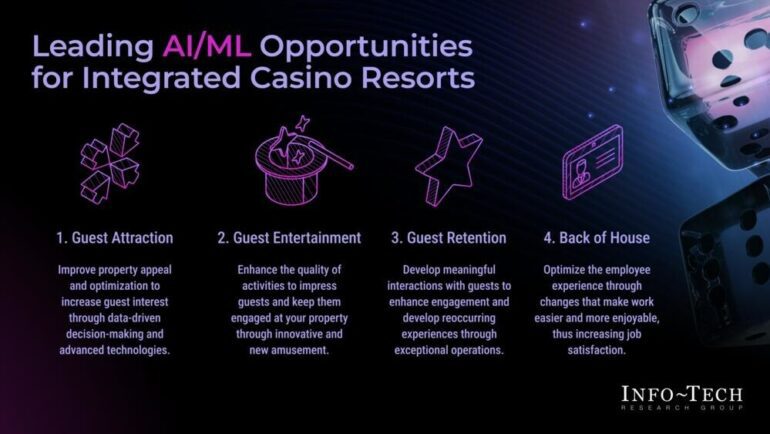TL;DR:
- The integration of AI and ML is transforming integrated casino resorts, promising solutions to industry challenges and enhancing guest experiences.
- Info-Tech Research Group offers insights and strategies through its publication, “AI/ML Use Case Library for Integrated Casino Resorts,” guiding leaders in leveraging AI effectively.
- Collaboration between business and technology leaders is crucial for successful AI adoption, requiring strategic alignment with organizational goals.
- The research emphasizes the need for compelling business cases to justify AI investments and highlights the risks of project failures due to delays and budget overruns.
- AI initiatives can enhance guest attraction, entertainment, and retention while optimizing back-of-house operations and improving employee satisfaction.
- By streamlining manual processes, AI enables resorts to reallocate resources towards enhancing guest interactions, fostering efficiency and innovation.
Main AI News:
In the dynamic landscape of integrated casino resorts, the integration of artificial intelligence (AI) and machine learning (ML) heralds a paradigm shift. These cutting-edge technologies offer solutions to a myriad of industry challenges, from optimizing operational workflows to delivering exceptional guest experiences. However, the successful adoption of AI and ML necessitates a cohesive strategy aligned with both technological capabilities and business objectives. To aid technology leaders in charting a course through this transformative terrain, Info-Tech Research Group presents its latest publication: “AI/ML Use Case Library for Integrated Casino Resorts.” This comprehensive research equips industry leaders with the knowledge and strategies essential for leveraging AI and ML effectively, thereby revolutionizing both the gaming and hospitality sectors.
“Integrated casino resorts are undergoing an unprecedented transformation in this era of technological advancement. A digital roadmap is imperative to navigate the complexities of AI and ML integration,” remarks Elizabeth Silva, senior research analyst at Info-Tech Research Group. “Collaboration between gaming and integrated resorts’ business and technology leaders is crucial to delineate tactical plans aligned with organizational objectives, thereby propelling the establishment towards exponential IT growth. An adept execution of AI and ML strategies within the next one to two years has the potential to shape the trajectory of the next one to two decades.”
Info-Tech’s research underscores the pressing need for modernization within the gaming and hospitality industry, emphasizing the significance of compelling business cases to justify the substantial investments associated with AI and ML implementations. The prevalence of project failures due to frequent delays and budget overruns underscores the criticality of meticulous planning and resource allocation in navigating the intricacies of industry modernization.
The firm’s AI/ML use case library serves as an invaluable resource for expediting the identification and development of AI and ML initiatives and expediting digital transformation endeavors for integrated casino resorts. The research delineates numerous avenues wherein AI and ML can exert a transformative influence on the industry:
- Guest Attraction: AI/ML facilitates data-driven decision-making and leverages advanced technologies to enhance property appeal and optimization, thereby heightening guest interest.
- Guest Entertainment: Emerging technologies introduce innovative and captivating activities to enhance guest experiences, fostering engagement and satisfaction.
- Guest Retention: AI fosters meaningful interactions with guests, bolstering engagement and fostering recurring experiences through seamless operations.
- Back of House: AI-driven solutions optimize employee experiences, simplifying tasks and augmenting job satisfaction, thereby enhancing operational efficiency.
Moreover, Info-Tech’s research elucidates how AI streamlines manual processes, thereby optimizing resource utilization and cost efficiency. This newfound efficiency enables integrated casino resorts to redirect resources towards enhancing guest interactions, thereby unlocking unprecedented levels of efficiency and innovation.
Conclusion:
The integration of AI and ML technologies presents a significant opportunity for the integrated casino resort market. Collaboration between stakeholders and the adoption of strategic AI implementation can lead to enhanced guest experiences, improved operational efficiency, and sustained competitive advantage in the industry. Businesses that effectively leverage these technologies stand to revolutionize their operations and elevate the standard of guest satisfaction.

